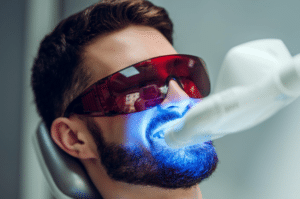Teeth Whitening for Sensitive Teeth: Gentle Solutions That Work
Teeth whitening can brighten a smile, but many people with sensitive teeth hesitate to try it. Harsh treatments often cause discomfort, leaving people searching for gentler options. The good news is that effective solutions exist. The right approach allows whitening without pain or irritation.
Why Do Teeth Become Sensitive?
Tooth sensitivity happens when enamel wears down or gums recede, exposing dentin. Dentin contains tiny tubes that lead to nerves inside the tooth. Cold, hot, sweet, or acidic foods can trigger pain when these tubes are exposed. Whitening products can make sensitivity worse because they often contain peroxide, which penetrates enamel and reaches the dentin.
Choosing the Right Whitening Method
People with sensitive teeth must choose a whitening method that works without causing discomfort. Some options are gentler than others.
Whitening Toothpaste
Many brands offer toothpaste that whitens without using harsh ingredients. These products rely on mild abrasives, such as silica, to remove surface stains without damaging enamel. Some also contain potassium nitrate or strontium chloride, which help block nerve signals and reduce sensitivity.
Whitening Strips for Sensitive Teeth
Some whitening strips contain lower levels of peroxide, making them a better choice. These strips work more slowly but deliver results without the sharp pain some people experience with standard whitening products.
Whitening Gels and Trays
Dentists often provide custom trays with professional-grade whitening gel. People with sensitivity can request a lower concentration of peroxide or shorter application times. Some gels also include desensitizing agents, making the process more comfortable.
In-Office Whitening
Professional whitening treatments offer stronger results in less time. Dentists can use desensitizing products before applying the whitening agent. Some offices offer laser or light-activated treatments that minimize discomfort while still brightening teeth.
Home Remedies for Whitening Sensitive Teeth
Natural methods can remove stains without causing irritation. These solutions work best for mild discoloration but help maintain results from professional treatments.
Baking Soda
Baking soda gently scrubs away stains without damaging enamel. Brushing with a paste made from baking soda and water a few times a week can brighten teeth.
Hydrogen Peroxide Rinse
A diluted hydrogen peroxide rinse can lift stains without harsh scrubbing. Mixing equal parts water and 3% hydrogen peroxide creates a gentle mouthwash that freshens breath and whitens teeth over time.
Coconut Oil Pulling
Swishing coconut oil in the mouth for 10–15 minutes may help reduce plaque and surface stains. This method does not work as quickly as chemical whiteners but offers a natural alternative.
Strawberries and Baking Soda
Some people use mashed strawberries mixed with baking soda as a whitening paste. Strawberries contain malic acid, which helps break down stains. This method should not be overused since acids can weaken enamel if applied too often.
Tips for Preventing Sensitivity During Whitening
People with sensitive teeth can take steps to prevent discomfort while whitening.
- Use a desensitizing toothpaste before starting any whitening treatment. These formulas help block nerve signals, reducing pain.
- Apply whitening products for shorter periods. Leaving them on too long increases the risk of irritation.
- Wait at least 30 minutes before eating or drinking after whitening. Teeth become temporarily more porous, making them more sensitive to temperature changes.
- Avoid acidic foods and drinks, such as citrus fruits, soda, and vinegar-based dressings. These weaken enamel and make sensitivity worse.
- Brush gently with a soft-bristled toothbrush to protect enamel and gums. Hard brushing can cause gum recession, exposing more of the sensitive dentin layer.
When to See a Dentist
Severe sensitivity or pain during whitening could signal underlying dental problems. A dentist can check for cavities, enamel erosion, gum disease, or exposed tooth roots before recommending a whitening treatment. Ignoring these issues can lead to worsened sensitivity, increased risk of decay, or even long-term damage to teeth and gums.
Signs That Indicate a Dental Visit Is Necessary
- Sharp, lingering pain after eating or drinking cold, hot, or sweet foods
- Sudden or worsening sensitivity that does not improve even after stopping whitening treatments
- Gum recession exposing the roots of teeth, which can lead to increased discomfort
- Visible cracks, chips, or thinning enamel that make teeth more vulnerable
- Persistent gum irritation, swelling, or bleeding, which could indicate gum disease
- Discoloration that does not respond to whitening, as it may be due to internal staining or an underlying issue
Long-Term Whitening for Sensitive Teeth

Eat Foods That Prevent Stains
Some foods stain teeth, while others help keep them white. Coffee, tea, red wine, and dark sodas cause discoloration. Acidic foods like citrus and tomatoes weaken enamel, making it easier for stains to set in. On the other hand, dairy products strengthen enamel, while crunchy fruits and vegetables help scrub away surface stains. Drinking plenty of water also helps wash away food particles before they stick to teeth.
Follow a Whitening-Friendly Oral Care Routine
Brushing with a soft-bristled toothbrush protects enamel while keeping stains away. A non-abrasive whitening toothpaste designed for sensitive teeth helps maintain brightness without irritation. Flossing daily removes plaque between teeth, preventing discoloration in hard-to-reach areas. Rinsing with water after meals prevents stain-causing particles from sticking to enamel.
Schedule Regular Dental Cleanings
Professional cleanings remove deep stains and plaque buildup that brushing alone cannot fix. Dentists use polishing tools to restore brightness without damaging enamel. A cleaning every six months keeps teeth looking whiter while improving overall oral health.
Limit Whitening Product Use
Frequent use of whitening strips, gels, or trays can increase sensitivity and wear down enamel. Whitening every few months is enough to maintain results without causing irritation. Instead of constant full treatments, occasional touch-ups with whitening toothpaste or a mild peroxide rinse help prevent stains from returning. A dentist can recommend the safest whitening schedule based on enamel strength.
Strengthen Enamel for Better Whitening Results
Stronger enamel holds whitening results longer and reduces sensitivity. Using fluoride toothpaste helps remineralize enamel, making it more resistant to stains. Some dentists offer professional remineralizing treatments that protect enamel while reducing discomfort. Waiting at least 30 minutes after eating before brushing prevents acid erosion, which weakens enamel over time.
Adopt Healthy Habits That Support White Teeth
Smoking stains teeth and weakens gums, leading to a yellowed smile. Staying hydrated prevents dry mouth, which contributes to plaque buildup and discoloration. Managing acid reflux protects enamel from stomach acid, which can make teeth appear dull. A combination of good oral hygiene and healthy lifestyle choices helps maintain a bright smile without relying on constant whitening treatments.
Your Smile, Brighter and Pain-Free
Your smile reflects your confidence, and at our clinic, we proudly offer gentle teeth whitening solutions tailored specifically for sensitive teeth.
Why Choose Our Practice?
We’re more than dental professionals; we’re dedicated to enhancing your comfort and confidence. Our personalized approach ensures each whitening treatment is gentle yet effective, making sensitivity concerns a thing of the past.
We understand that whitening sensitive teeth requires careful attention, and we’re here to support you at every step. From your initial consultation to achieving your brighter, healthier smile, our team prioritizes your comfort and satisfaction.
[Visit our home page] to explore our gentle whitening solutions or [book your appointment] today.



